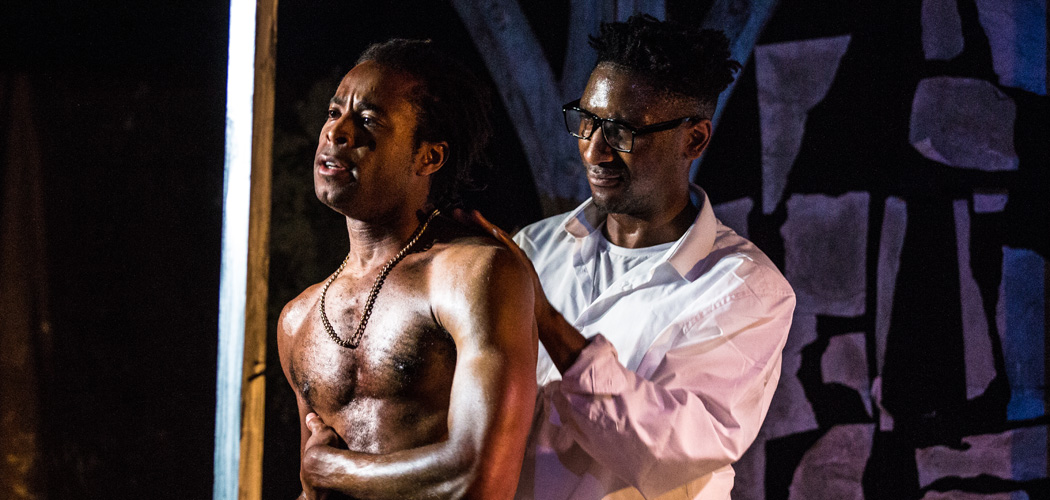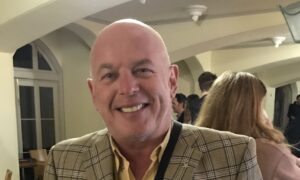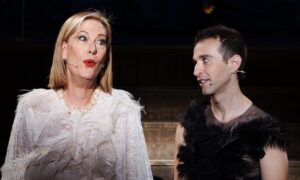One of the last productions of the Queer Festival at the King’s Head Theatre in Islington consists of seven short plays by seven different authors and is both enthralling and riveting. A superb way to finish this season of some the best gay themed theatre to be staged this year. The pieces’ time period from 1950 to the present day shows the changes in attitudes and acceptance levels to homosexuality.
The first play, Happy and Glorious by Philip Meek, takes place on the day of the Queen’s coronation in 1953 where a group of well-to-do gentlemen are celebrating the event. Three of them want to stand up for their rights but one, an aged actor – played by a magnificent Paul Carroll – has only his career and does not want be branded a nefarious poof, a criminal in the eyes of the law. His is a world of secrecy. He is still attracted to a bit of rough – a south of the river black guy eager to improve his own prospects – but believes that boundaries should be in place, that class should respected and kissing between men was still too intimate. This play is about fear which is beautifully examined and the start of attitudes changing. There is a lovely touch where the term ‘uncles and nephews’ is used, with today’s equivalent being sugar daddy and working boy.
The second play, Mister Tuesday by Jonathan Harvey, has moved the time frame to 1965 and features two stand-out performances. A very enigmatic Jack Bence plays Peter who lives in a boarding house in Liverpool where every Tuesday he has a liaison with Jimmy played by a very watchable Elliot Balchin. Opening his friend’s wallet Peter realises that he has been lied to and that Jimmy is really a policeman. Themes of bisexuality, cruising in toilets, blackmail and coming to terms with your sexuality are brought together in twenty minutes of well crafted acting that showcases the hypocrisy of the law of the time, and that again times are changing.
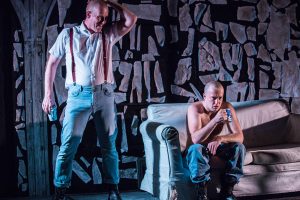
Reward by Jonathan Kemp is the third play and moves the year to 1977 and the Queen’s Silver Jubilee. It focuses on brutality and tells the story of a relationship between skinhead Spike, played again by a terrific Jack Bence, and Donald, played by Michael Duke, an educated black man going to university who gets stranded at a bus stop waiting for the night bus. Spike has been brutalised by his father, played by Paul Carroll, with an aggression that is scary in its accuracy. Spike knows nothing but violence so when Donald enters his life and teaches him to read his life opens up. The tenderness of this piece linked with the nervous energy that comes with physical attraction makes for a very powerful and emotional story beautifully executed by three actors at the top of their game.
1984 by Patrick Wilde, the fourth play, is set in Brighton at the time of the Tory Party conference where Tommy, played by Alex Marlow, and Alan, played by Elliot Balchin, are in relationship but Alan scared of being fired from his job working as a speechwriter for Margaret Thatcher does not want people to know he’s gay. This is a story about political ambition, living in shame and the huge difference that was emerging between ‘the haves’ and ‘the have nots’. It also shows the effect being totally ignorant about AIDS had on people in Thatcher’s Britain. The acting in this play is emotive and explosive – as the bomb in the Grand Hotel goes off. Enter Spike from story three who has been kicked out by his father and is living rough. When he attempts to mug and rob the couple, a chain of events starts that is simple stunning and is a reason why this mesmerising set of plays has to be seen.
Princess Die by Matt Harris, the fifth play, moves the year into 1997. Drag queen Shane, played by Alex Marlow, has a cocaine problem; he is paranoid, he cannot distinguish between fantasy and reality and longs for companionship with Tyler, played by Myles Devonte, but know that his ways will destroy the relationship before it has a chance to bloom. His own lack of fidelity will also ruin him. This is sharp, precise storytelling where raw human emotions are opened up. And as news of Diana’s death comes from the radio this makes for a sad but also perfect way to conclude this particular story.
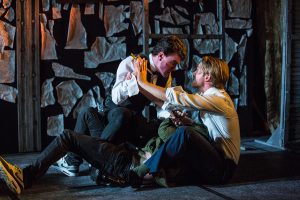
Brothas 2 by Topher Campbell, the sixth play, takes us to 2004 and tells the story of upwardly mobile black guys Dwayne and Femi, played by Michael Duke and Myles Devonte. They like the finer things in life, they drink Cristal Champagne, smoke weed and use their social media site Brotha 2 Brotha to cruise – going to clubs is not for them. This is a play about black culture and social acceptance told with a great use of comedy and delivered by two extremely fine actors who are so in tune with the material they are delivering. It makes for very funny and informative theatre and perfectly showcases that applied stereotypes must be challenged and broken down, but inherited culture is also to be valued.
The Last Gay Play by Joshua Val Martin is the concluding story and brings us right up to date. Robin and Zak are going to get married in church and at the centre of it all is Robin’s father, played by Paul Carroll, as the priest who is going to marry them. This is a study in the conflicts raised by faith and religion and is also very poignant and current, delivered again by three actors that are just so perfect together.
Outlaws to In-laws is a pure delight. A truly magical theatrical experience. You are taken on a true journey and with a beautiful and very moving surprise that links the plays together, you will leave the theatre having been totally entertained and moved. Theatre like this is to be treasured and celebrated. A perfect way to end the magnificent King’s Head Theatre’s Queer Festival 2017.
*****
Outlaws to In-laws runs to Saturday 23rd September. Box office 020 7226 8561. kingsheadtheatre.com



